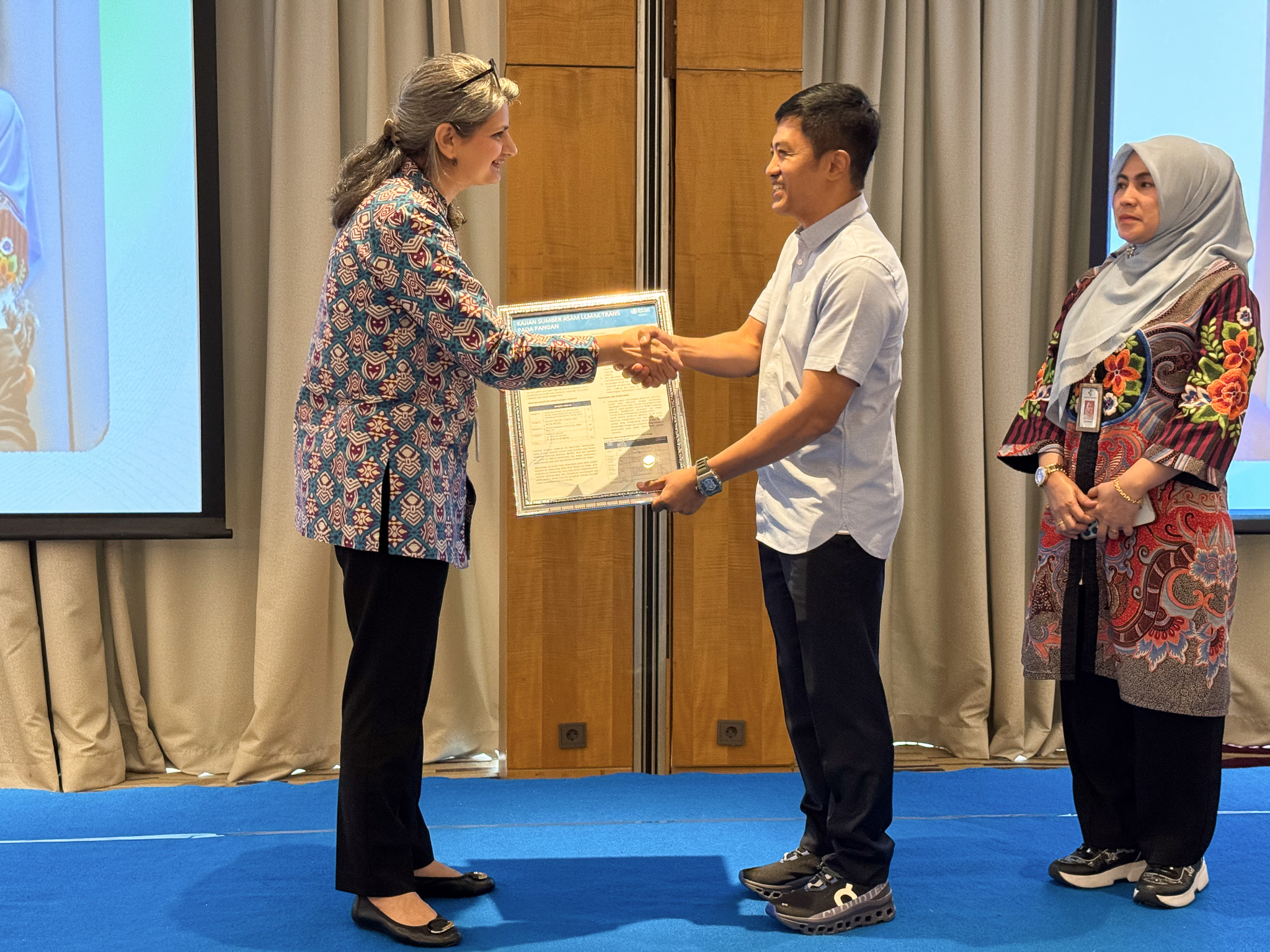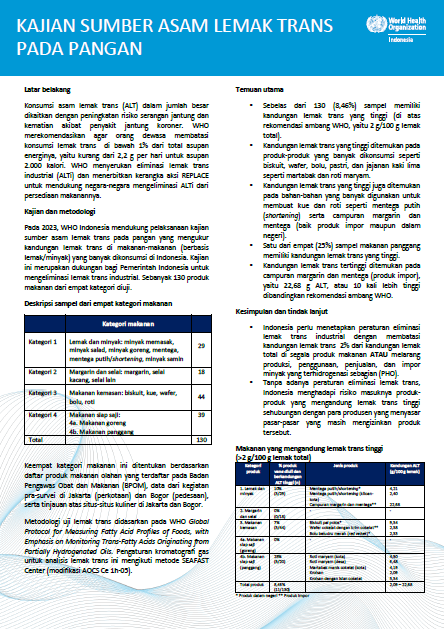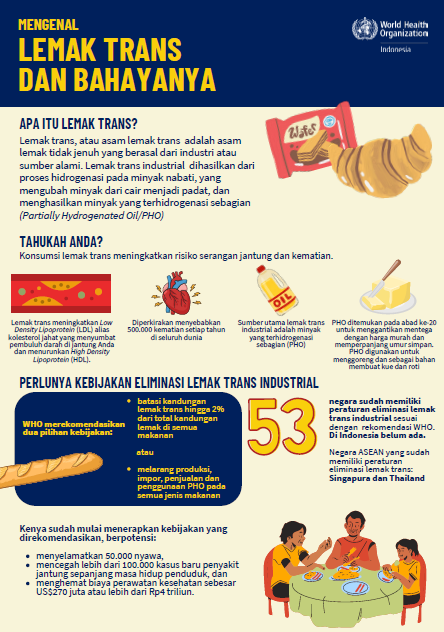
On 6 May 2024 Dr Lubna Bhatti, Team Lead (NCD and Healthier Populations) WHO Indonesia, presented fact sheets on the WHO-supported study on trans-fatty acids to Prof. Dr Dante Saksono Harbuwono, Vice Minister of Health of the Republic of Indonesia. This moment marks the official launch of the results of the study. Credits: WHO/Fieni Aprilia
The World Health Organization (WHO) has published the results from a ground-breaking study on the dietary sources of trans-fatty acids in Indonesia’s food supply. This launch aims to support the issuance of government regulations to eliminate trans fats.
Trans fats or trans fatty acids are unsaturated fatty acids that come from natural or industrial sources. Consumption of trans fats can significantly increase the risk of heart attacks and contributes to an estimated 500 000 deaths from coronary heart disease globally each year.
The baseline study involved laboratory testing of 130 products across four food categories: oils and fats, margarines and spreads, packaged foods made with fats (such as biscuits, cookies, wafers, cakes and bread) and prepared foods such as fried noodles, fried rice, fried chicken, potato fries and bakery items.
WHO recommends trans fat levels in food of less than 2 grams per 100 grams of total fat. However, almost 10% of the products surveyed or around 11 foods contained trans fat levels exceeding these recommendations.
High levels of trans fats are also found in popular and widely consumed snack products, such as biscuits, wafers, bakery products and street snacks such as martabak. The highest concentration of trans fats is found in a mixture of margarine and butter, which is 10 times higher than the WHO recommended limit.
"In Indonesia, it must be acknowledged that there is still a lack of data regarding trans fats in food. The Ministry of Health really appreciates the efforts of WHO Indonesia to conduct a study of trans fat content in food," said the Vice Minister of Health of the Republic of Indonesia, Prof. Dante Saksono Harbuwono at a high-level event in Jakarta, Monday (6/5).
The Vice Minister of Health Dante said that the most effective way to reduce trans fats in the food supply is through regulation. WHO also encourages countries to adopt one of two best practice policies for eliminating trans fats.
The first step is to limit trans fat levels to 2% of the total fat content in all foods. The second step, banning partially hydrogenated oil (PHO), includes banning the production, import, sale and use of PHO in all foods.
To support this policy, in 2018 WHO launched the global trans fat elimination initiative, REPLACE, which calls on countries to eliminate trans fats globally by 2023.
The REPLACE framework consists of six strategies: first, reviewing trans fat dietary sources and policy landscape; second, encouraging the replacement of trans fats with healthier fats and oils; third, enact regulations to eliminate trans fats; fourth, assessing and monitoring trans fat content in the food supply; fifth, creating awareness among policy makers, food producers and the public; and sixth, ensuring compliance with policies.
Currently, 53 WHO Member States have adopted best practice policies for eliminating trans fats, including Denmark which became the first country to implement this policy since 2003.
"Denmark is the first country to ban trans fats in the food industry and this has been done since 2003. This can be done because before this ban their death rate from heart disease was very high," said the Vice Minister of Health.
Ten years after the regulation was implemented, without other specific interventions, the death rate from heart and blood vessel disease fell by 20 percent.
The Vice Minister of Health Dante emphasized that the Government of Indonesia is also fully committed to implementing regulations prohibiting the use of trans fats in the food industry in Indonesia.
The Vice Minister of Health also assessed that limiting trans fats would reduce heart disease while saving Indonesia trillions of rupiah. He hopes that the preparation of regulations involving multiple sectors can make Indonesia the next country to implement regulations according to good practices recommended by WHO.
“We will formulate these regulations in Indonesia. Therefore, people will be healthier so that the death rate due to heart and cardiovascular disease will decrease," said the Vice Minister of Health.
The Vice Minister of Health explained that the implementation of trans fat regulations would be accompanied by massive education, especially in the informal sector such as small and medium traders.
“To date, 53 WHO Member States globally have adopted best-practice trans fat policies, and WHO is working closely with the Government of Indonesia to ensure it becomes the next,” said WHO Representative to Indonesia, Dr N.Paranietharan.
“The release today of WHO’s baseline study marks an important step forward in improving the food environment for more than 275 million Indonesians, enabling them to live longer and healthier lives,” he continued.
About the Ministry of Health of Indonesia
The Ministry of Health of Indonesia is dedicated to safeguarding the health and well-being of its citizens, ensuring access to quality healthcare services, and promoting public health initiatives. Through collaborative efforts with stakeholders and communities nationwide, the ministry strives to enhance healthcare infrastructure, disease prevention, and healthcare access, ultimately improving the overall health outcomes for all Indonesians. Explore more about the Ministry of Health's initiatives and contributions at kemenkes.go.id or stay connected via their social channels.
About WHO
Dedicated to the well-being of all people and guided by science, the World Health Organization leads and champions global efforts to give everyone, everywhere an equal chance at a safe and healthy life. We are the UN agency for health that connects nations, partners and people on the front lines in 150+ locations – leading the world’s response to health emergencies, preventing disease, addressing the root causes of health issues, and expanding access to medicines and health care. Our mission is to promote health, keep the world safe and serve the vulnerable.
For media inquiries, please contact:
dr. Siti Nadia Tarmizi, M.Epid
Head of Communication and Public Service Bureau, MoH
kontak@kemkes.go.id
+62 81281562620
Michael Vurens van Es
Communication Officer, WHO
vurensm@who.int
+62 81181101554
Related documents:


